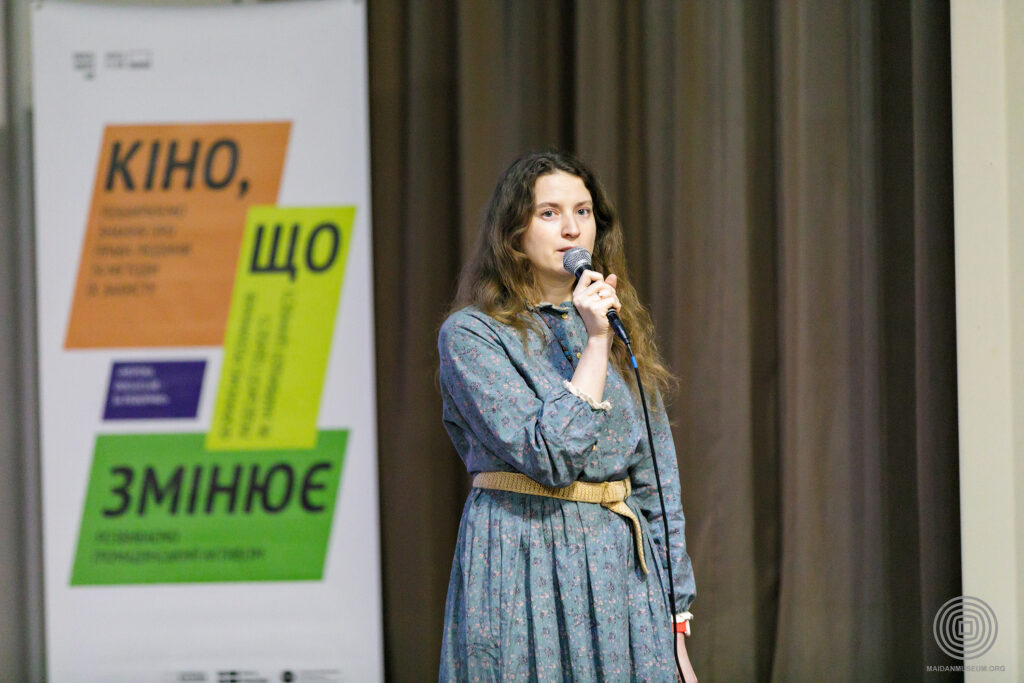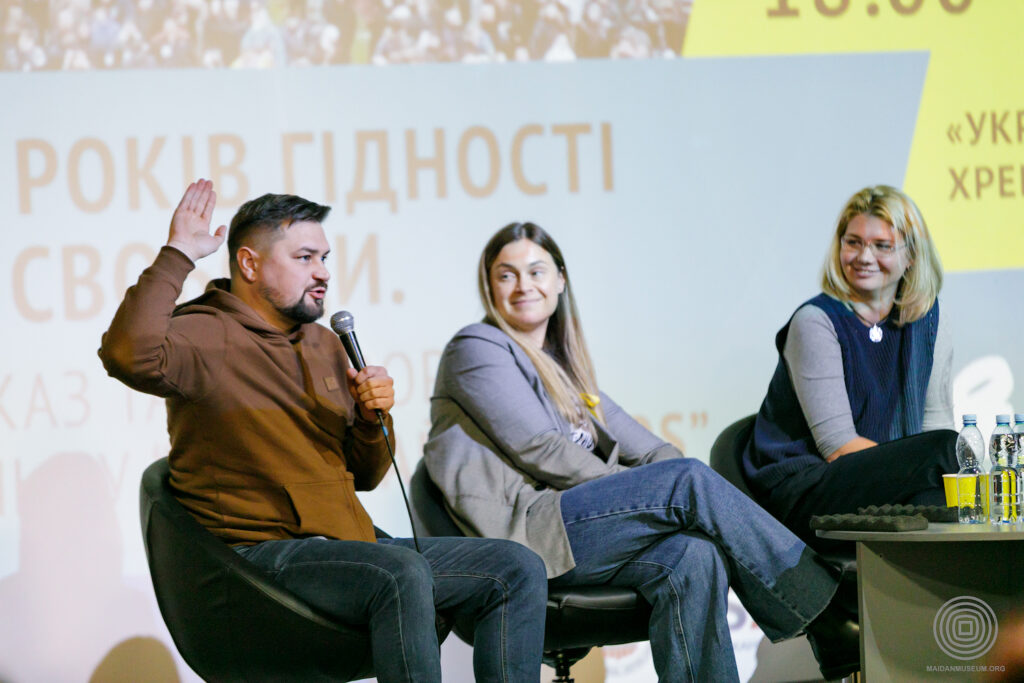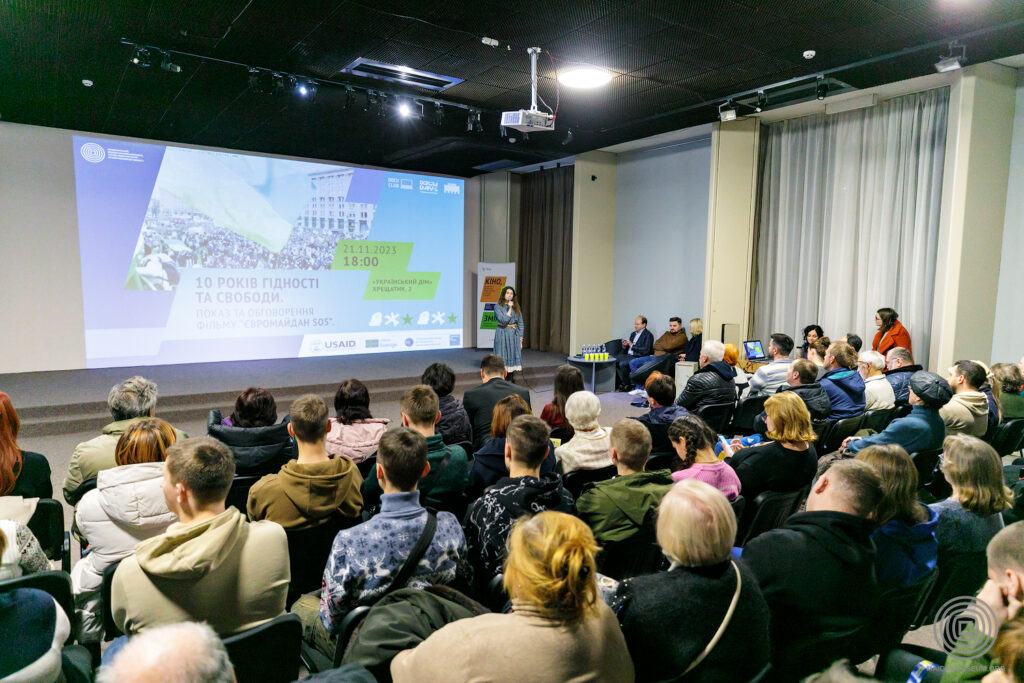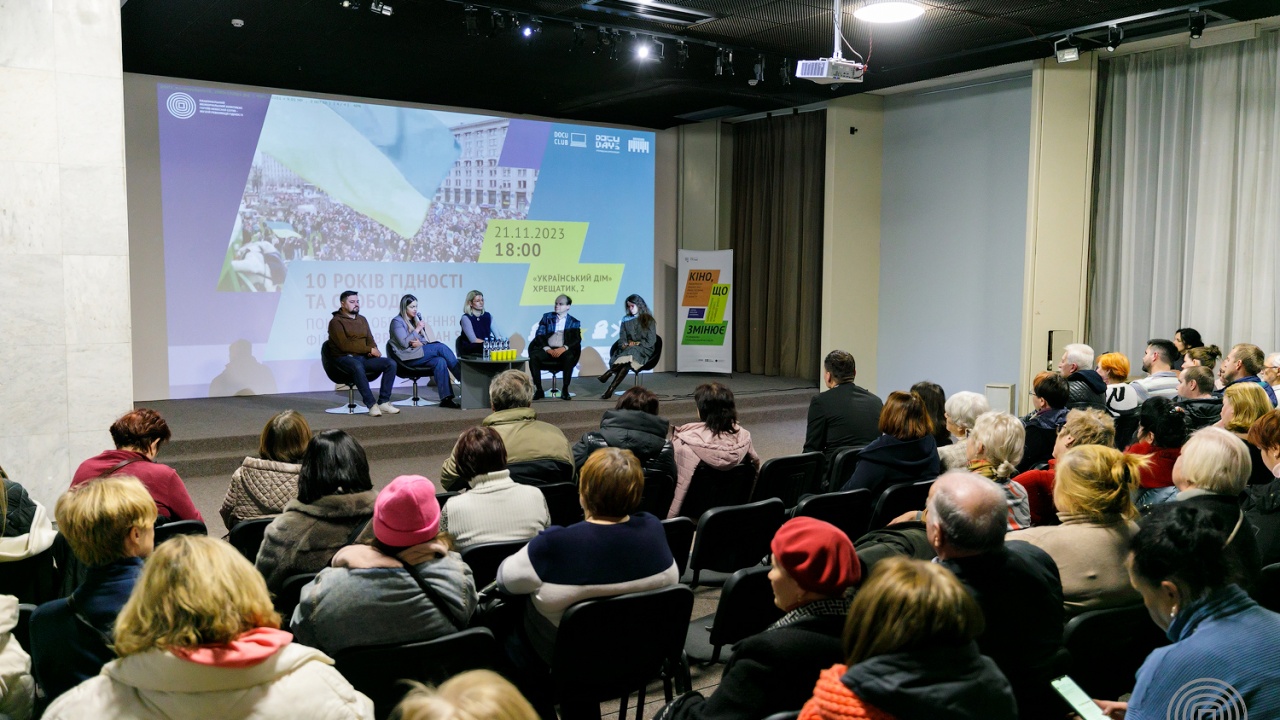The film is part of the documentary almanac “Encyclopedia of the Maidan,” created by the NGO Docudays UA in 2015. It tells the story of the Euromaidan SOS initiative, which during the Revolution of Dignity created a hotline to help protesters, documented human rights violations during the protests, and coordinated legal support for injured Euromaidan activists.
The auditorium of the Ukrainian House was filled to capacity with viewers, participants of the Maidan events, and activists. They gathered to discuss the lessons and consequences of the Maidan and to remind everyone about the changes that have taken place in the country since the Revolution of Dignity and the demands of the protesters that have not yet been fulfilled.

Photo: Maria Tsypiashchuk
The moderator of the meeting, Maria Tsypiashchuk, a human rights activist and the head of the Docudays UA film club “Human Rights Through the Lens,” asked the participants to share their own experience of participating in the Maidan and to reflect on the role of the events of the Revolution of Dignity in shaping civil society in Ukraine.
Maria Tomak, Head of the Crimean Platform Department at the Mission of the President of Ukraine in the Autonomous Republic of Crimea, joined Euromaidan SOS from the first day of its work. She recorded human rights violations during the protests in the capital, went to Crimea after the Maidan ended, and worked in Donetsk in late spring 2014. According to her observations, at that time, active citizens did not feel the support of the state, as state institutions were neutralized and virtually non-functioning. In her opinion, this complicated the protection of our territories from the aggressor. Reloading state institutions was one of the main tasks for the country's authorities. One of the most significant results of the Maidan was the entry of civic activists into the civil service.
“In 2014, I would not have even thought that I would become a civil servant, but I ended up working for the Representative Office of the President of Ukraine in the Autonomous Republic of Crimea together with Tamila Tasheva, a civic activist who co-founded Crimea SOS. I have a feeling that nothing has changed with regard to my work. I cooperate with civic activists to protect human rights in Crimea, just as I did before I joined the civil service,” says Maria Tomak. “The country needs civic activists in government agencies, because these people are capable of creating audacious projects, organizing work effectively, engaging citizens, and communicating with the broader society to achieve goals. This experience and skills are also necessary to communicate with our external partners: with every year, it gets harder and harder for us to “keep the focus” on the occupied territories. But we have to do this so that no one is tempted to encourage us to “give” Crimea and Donbas to Putin.”

Speakers: Vitaliy Selik, Maria Tomak, Anastasia Rozlutska.
Another important result of the Maidan was emphasized by Vitaliy Selyk, co-founder of the volunteer initiative “Dare to Restore”: “After the end of the Maidan, the people who participated in it in 2012-14 took active part in the development of the country on new, democratic principles. Thanks to their activism and support, we have succeeded in implementing several important reforms, including the medicine, education, and police ones. We might not have succeeded in everything, but the country has changed significantly over the past 10 years.”
During the Revolution of Dignity, Vitaliy Selik volunteered at the Euromaidan SOS hotline and, in his words, “did whatever they asked.” In his opinion, this experience of mutual support on the Maidan helped us survive after the beginning of Russia's full-scale invasion: “On the Maidan, we realized that we should not rely on the state in solving complex problems: we ourselves are the state. In the spring of 2022, my friends and I created a volunteer organization called “Dare to Restore” to rebuild destroyed schools, kindergartens, and private homes. This need to help each other was born on the Maidan. The feeling of being innumerable gives us strength and support in difficult times.”
Another panelist, Anastasia Rozlutska, who is a civic activist and founder of the E-Language platform, worked for Euromaidan SOS by coordinating the hotline, organizing volunteers, going to courts, and communicating with relatives of the deceased activists. At the same time, she continued to develop the Free Ukrainian Language Courses, an initiative launched before the Revolution of Dignity. The volunteers of the Free Courses taught Ukrainian to people all over the country and, of course, on the Maidan. It was there that the Ukrainian language began to gradually regain its position – with the help of activists.
“After the Maidan, language remained the main concern for me. We united various language-related organizations into the civic community “Language Unites,” and its members made every effort to pass the Language Law,” says Anastasia Rozlutska. “We have new tasks today, as we need to create opportunities for active use of the language. We require courses, training projects, cultural platforms and institutions that will help learn Ukrainian and put it into active use not only by Ukrainians but also by foreigners, because the demand for language learning is currently very high.”
Dmytro Huziy, media lawyer and coordinator of the Maidan legal aid, spoke about the public demand for fair trial: “After the Maidan, society demanded lustration of all judges. This is an understandable requirement, but as a lawyer, I do not know of any cases in the world practice when it would be possible to replace all judges at once, especially during actual collapse of state institutions. We have not succeeded in all aspects of the judicial reform we have launched. This means we have to keep fighting – the Maidan is still going on.”

Photo: Discussion of the film
At Euromaidan SOS, Dmytro Huziy coordinated the provision of legal aid to the victims: “The Maidan lawyers have been working day and night to release protesters arrested by Berkut. We did everything in our power to collect evidence for a proper trial in court. I have to say that many of these cases resulted in the punishment of the perpetrators in the courts, so it was not in vain.”
The discussion of the film resonated greatly among the audience. The screening participants joined the lively and sometimes heated discussion. One of the representatives of the Maidan victims said that, while celebrating the victories of the Maidan, we should also talk about its defeats. After all, in several months, about 300 Maidan cases will be closed forever due to the expiration of the statutory limitations, and the collected evidence base may be lost for good.
Another participant of the event emphasized in her speech that the authorities still do not always listen to citizens and are often irresponsive to their appeals, even if they relate to sensitive issues.
Anastasia Rozlutska reminded that civil society must remain persistent in its demands and control of the authorities. Active citizens should unite, write appeals, draw up petitions, conduct campaigns, and “push” the authorities to implement the reforms necessary for the development of society. The Maidan proved that this method of bringing about change remains effective in Ukraine.
The development of the DOCU/CLUB Network is funded by the United States Agency for International Development (USAID), the Embassy of Sweden in Ukraine, the National Endowment for Democracy (NED) and Fondation de France.
The opinions, conclusions, or recommendations are those of the authors and compilers of this publication and do not necessarily reflect the views of the governments or charitable organizations of respective countries. The authors and compilers are solely responsible for the content of this publication.
